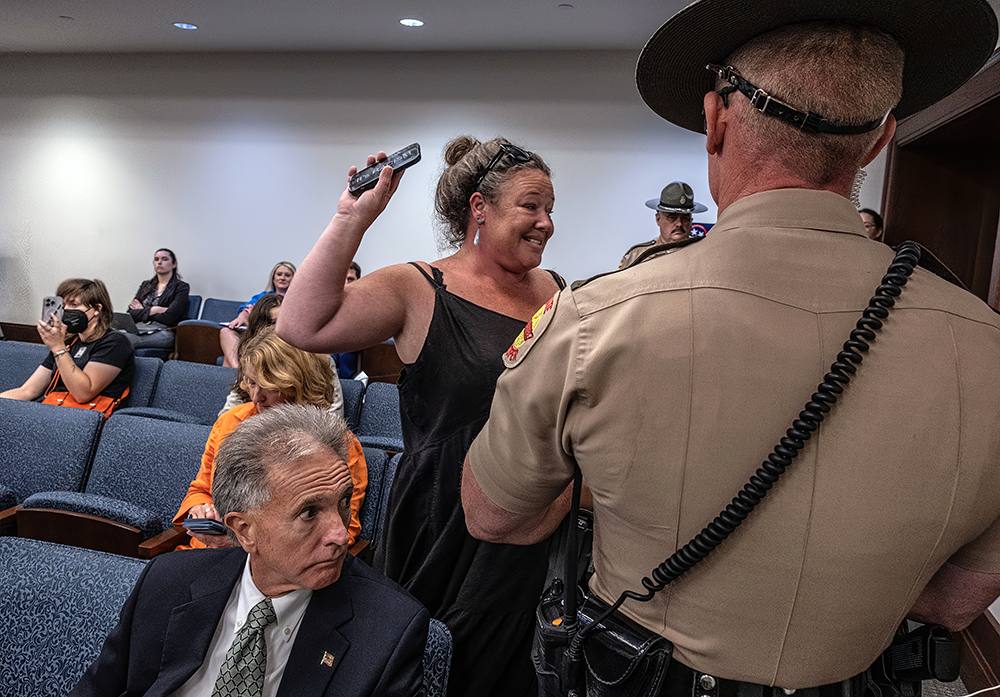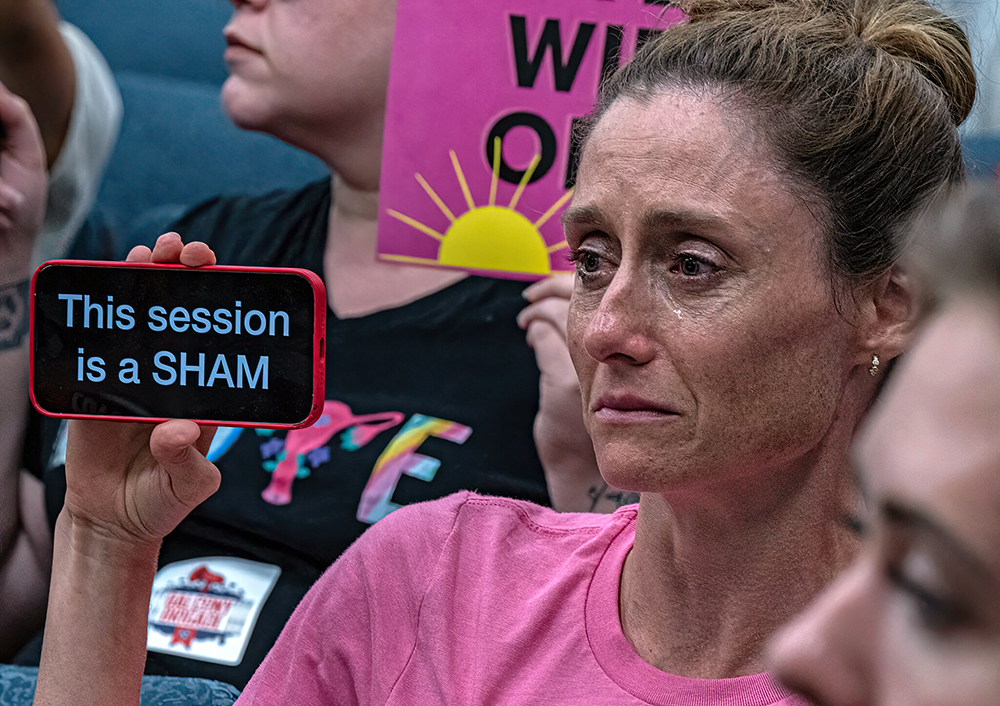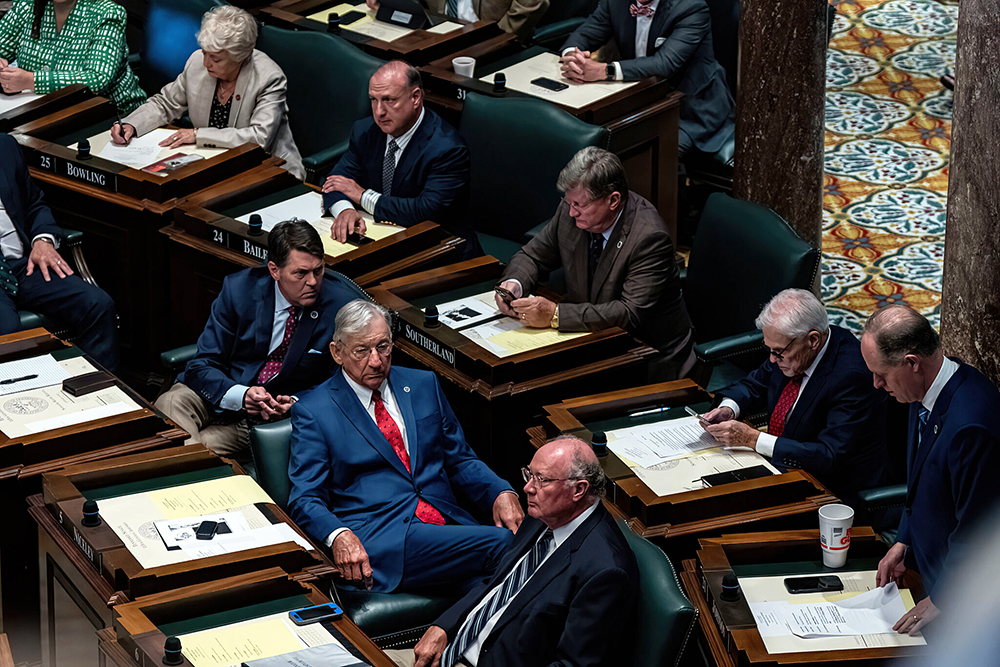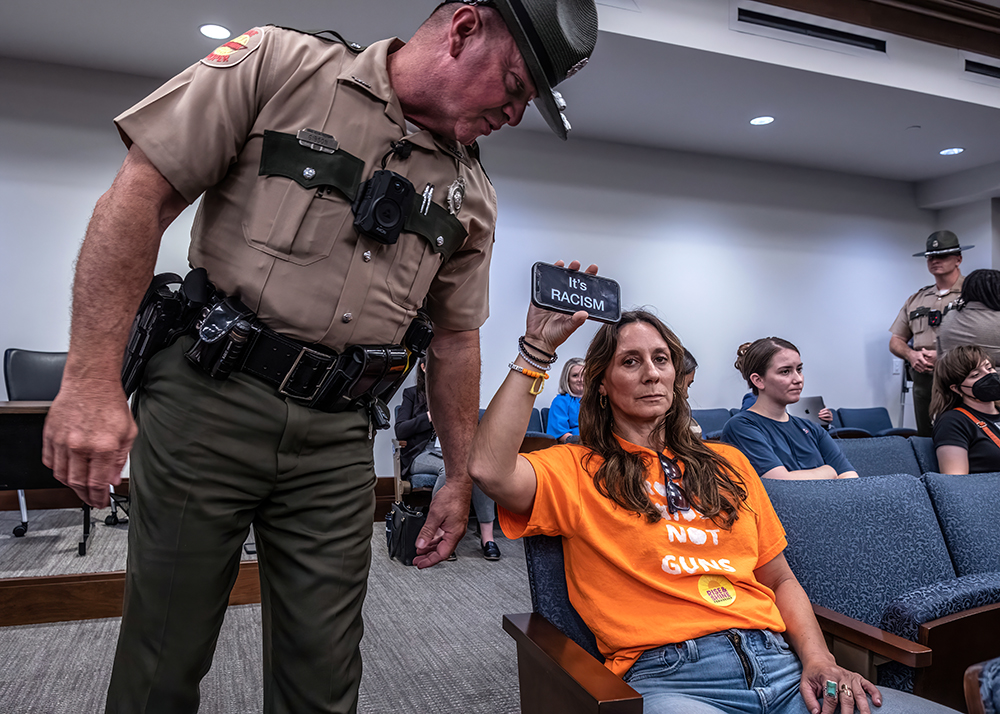Republicans manhandled democracy last week in Nashville during the special session with tough tactics displayed in plain view.
They flexed their supermajority superpowers over most anyone who didn’t agree with them, especially members of the taxpaying public. The GOP flex (and one unlawful overreach, according to a judge) became the story that emerged from the session that was ostensibly meant to make kids safer at school.
Tennessee Highway Patrol officers made the “manhandle” metaphor real in one of the boldest, coldest demonstrations of Republican power during the entire session. A woman in a committee audience held a sign that read, “One kid is greater than all the guns.” A Republican leader ordered her to put it down. She didn’t. He then ordered large state troopers in the room to remove her, physically if need be. They did.
Two troopers grabbed the woman’s upper arms and lifted her from her seat. They paraded her down the aisle, across the front row in full view of gathered lawmakers. She spoke, her voice initially quivering as they forced her from the room. She then pierced her nerves, found her voice, and yelled, “This is not what democracy looks like!”

Everyone heard. But lawmakers did nothing. They simply waited for troopers to identify and escort yet another sign-holding woman out. The committee’s GOP chairman waited for the doors to close, cleared his throat, and dispassionately continued the work before the committee. He later apologized (to some) on X (formerly Twitter).
The episode was easily the most visible display of what Tennessee democracy looks like under Republican control. But it wasn’t the biggest or even the most important display of the session. Some in the state GOP silenced not only the public, but other lawmakers, even many other Republicans.
Elected officials went to Nashville in earnest, expecting a review and a debate on more than 200 bills they brought. Republicans decided to only allow review and debate on four in the Senate for reasons outsiders could only guess at. GOP House members certainly did not seem to be in on the game.
Some Democrats opined that the entire session was a GOP dance, choreographed over weeks between when the session was promised in April to when it commenced in late August. Their plan, it seemed, was to do as little as possible, complete the mandated terms of the session, and give GOP Governor Bill Lee a few things for which he asked.

The session’s work stopped last week with an intense standoff between House and Senate Republicans over whether or not to allow more bills. That work continued this week with little predictability on an outcome. About the only thing House and Senate Republicans could agree on was no new rules on universal background checks for guns nor any red flag laws.
What did Lee think? It was his party, after all. No one really knew, not during the session anyway. He promised he’d only speak publicly after it wrapped. As of Monday morning, his most recent social media posts concerned the passing of former Tennessee Governor Don Sundquist and attending a ham breakfast at the Tennessee State Fair.
The GOP flex left some wondering if Republicans had jumped the shark, pushed their influence (and general disdain for dissent) too far in front of everyone. Would their callous affronts to public sentiment push new voters to take notice and show up for future election days? In short, would the supermajority’s superpowered flex backfire on them?

Rules: The First Flex
From the start, Republicans, it seemed, did not want a repeat of April.
In March, three 9-year-old children and three teachers were shot and killed in a pre-planned attack at Nashville’s Covenant School. Many lawmakers routinely offered thoughts and prayers. But thousands of Tennesseans wanted more and descended upon Capitol Hill to urge leaders for some form of gun control.
In the hallowed, marbled lobby between the House and Senate chambers, protestors yelled, “Gun control now!” at lawmakers (protected by a wall of state troopers) and held signs that read, “Am I next?” They protested from the House gallery on March 30th, joined by the now-well-known Tennessee Three, two of whom, of course, were expelled soon after but reinstated by voters later. On April 4th, hundreds of young people shouted, “Fuck Bill Lee!” in unison on the steps of the Tennessee Capitol building.
Soon after that (but probably not because of it), Lee asked legislative members of his own party to pass an extreme order of protection law. It would allow guns to be temporarily removed from those deemed to be a “current and ongoing” threat to themselves or others. The ask came after teacher Cindy Peak and Covenant head of school Katherine Koonce — friends of First Lady Maria Lee — were killed in the school shooting.
The killings and the personal plea from Lee were not enough to sway GOP lawmakers, though. Not a single one of them would pick up Lee’s legislation, and many said so out loud. Instead, leaders sprinted the budget through committees and floor votes and hightailed it out of Nashville.
But Lee promised them a special session on “public safety.” Not wanting a repeat of April (and the raucous protests that came with it), it seemed, House Republicans crafted a plan to clamp down on dissent, public speech, and the public in general, in and around the vaunted statehouse.
Protest signs (and the like) were outlawed (even a standard letter-sized piece of paper with a statement written with a pen). And the public got only limited access to spaces once wide open. On the House floor, if lawmakers got personal in their remarks or strayed off topic, Speaker Cameron Sexton (R-Crossville) could silence them. Do it four times, and a lawmaker would be silenced for the remainder of the session. Who got to call balls and strikes here? Only Sexton.
The decorum rule was seen by many as a way to manage the unruly Justins, Rep. Justin Pearson (D-Memphis) and Rep. Justin Jones (D-Nashville). Their expulsions by Republicans in April backfired on the GOP, made the Justins famous, and poured piles of political capital and campaign donations upon them.
From the floor last Tuesday, Jones asked Sexton if he’d get his committee assignments back. Sexton quickly ruled him out of order. Jones asked why, especially since others had asked off-topic questions, like about the air-conditioning. Sexton didn’t answer but allowed the House clerk to explain that “the House speaker makes rulings on what is in order and not in order.”
These rules were the first big GOP flex of the session. It broadcast their power and dared any to cross them, lest they be diminished or banished. Though many questioned whether the sign rule was constitutional and if the decorum rules silenced the democratic will of lawmakers’ many constituents.
The GOP flexed the decorum rules against dissenters this Monday when the House voted to silence Jones on the floor. Sexton ruled Jones was out of order twice. No similar vote nor silence came for Rep. Gino Bulso (R-Brentwood) after he, too, had been out of order twice. But the clerk said the first instance was only a warning. After Jones was silenced, the gallery erupted in jeers, and the Democratic caucus walked off the House floor in protest.
In an email newsletter, Pearson called the decorum rules “draconian” and said they “were carefully crafted to silence the voices of progress and solidify [the GOP’s] stranglehold on proceedings.” When he told lawmakers that “we are a democracy,” one Republican House member told him, “We are not because we are a republic.” Pearson disagreed with the notion in his newsletter. Then, based on GOP moves, he kind of agreed.
“This is not a democracy,” he wrote. “This is a mobocracy.”
The Clearing
The story above tells of how — thanks to the GOP no-signs rule — state troopers forced that woman from the House committee. It was on the explicit instructions of Rep. Lowell Russell (R-Vonore), a former state trooper. He chaired the House Civil Justice Subcommittee that day and warned the crowd, “If there’s an ongoing problem with these signs, we’ll just clear the room.” He then singled out the sign-carrying women by row and by seat. They were removed. Then, Rep. Antonio Parkinson (D-Memphis) started talking. The crowd started clapping. And Russell proved he was nowhere near finished flexing.
He gave a “last warning” on the applause and threatened again to “clear the room.” A Republican bill was tabled. The audience clapped again and Russell chided, “Now, are we going to quieten down and listen or are we going to sit there and clap?” His stony expression hid his next move. “All right, troopers, let’s go ahead and clear the room.”
They did. They even cleared out parents of Covenant School children. Only members of the media and legislative staff were allowed to stay, though Lowell allowed those slated to testify to return when they were called from the hall. But the ejected crowd was shocked as they milled about, filing out the doors. One woman paused before the committee and said, “This is not who you dreamed about growing up to be when you were children.”
Russell’s clearing — the treatment of taxpayers and Covenant School parents — dominated headlines, not any great Republican ideas on how to keep school kids safe or to protect Second Amendment rights.
U.S. Rep. Steve Cohen (D-Memphis) said the move marked “truly dark days” at the legislature. Rep. Gloria Johnson (D-Knoxville), the un-expelled third of the Tennessee Three, said the move showed that “these Republicans have lost all moral footing.” Sen. Heidi Campbell (D-Nashville) said it was proof “we’re living in a totalitarian state.” Russell said it was largely the audience’s fault, not his, and apologized … kind of.
“If you were in attendance [of the committee] … and were not participating in the loud, disruptive behavior, I personally apologize that you had to watch the committee meeting from the hallway,” Russell said in a six-part X post on Friday. “It was unfortunate that the noise level had gotten to the point that it did.
“Let me be clear that each person in attendance on Tuesday matters and a safer Tennessee matters.”
Others wanted more answers. House Minority Leader Karen Camper (D-Memphis) said, “This needs to be explained.” Rep. Jason Powell (D-Nashville) asked Lee, in an official letter, if House chairs even have the authority — by the state constitution or any state law — to order state troopers to remove members of the public from committee rooms. No response had been given as of press time. Sen. Charlane Oliver (D-Nashville) asked this and more from Tennessee Attorney General Jonathan Skrmetti. He quickly asked the judge in the signs case to dissolve the matter, according to the The Tennessee Journal.
Last Wednesday, Sen. Richard Briggs (R-Knoxville) took a softer approach. He opened the Senate State and Local Government Committee saying, “I know it might not seem like it sometimes … they said to be sure to let folks know we’re glad you’re here.”
As for the signs, they were later allowed, but not until the American Civil Liberties Union of Tennessee (ACLU-TN) got a court involved. The group sued Sexton, the House clerk, and sergeant-at-arms after Lowell’s clearing. Davidson County Chancery Court Judge Anne Martin issued a restraining order last Wednesday banning the House’s ban on signs.
“It is troubling how often the citizens of our state have to return to the courthouse just to protect their basic constitutional rights from being violated by this GOP supermajority,” House Democratic Caucus Chairman John Ray Clemmons (D-Nashville) said at the time. “My colleagues, who are so afraid of a piece of paper silently stating an opinion that they would forcibly remove them from a committee room, have yet again embarrassed our great state and disrespected its citizens in doing so.”
Sexton’s attorneys argued the court overstepped, according to Tennessee Lookout, and urged an emergency hearing on the matter. A hearing was slated for Monday.
The Senate’s Great Big Table
Silencing lawmakers’ remarks. Shutting out the public to the “People’s House.” Forcibly removing dissenters from public places for breaking some brand-new rule that may or may not be legal. They offended certain sensitivities and, again, broadcast party control.
But the Republicans’ next big move had a material impact on the subject and scope of the real business at hand. With it, the Senate froze the session in its tracks, freezing out dozens of ideas of dozens of lawmakers, shocking House Republicans, and making moot most of the work House members had done and would continue to do during the session.
Last Tuesday morning, the Senate Judiciary Committee passed three bills, ones brought by Lee. Then, without comment or explanation, committee chair Sen. Todd Gardenhire (R-Chattanooga) tabled 52 bills, the remainder of the committee’s agenda.
This meant every other idea proposed by every other legislator with a bill on the docket that day would never get heard, nor an up or down vote in the special session. House Republicans were not happy.
“Congratulations @tnsenategop on receiving the 2023 Ostrich Egg!” read an X post from the Tennessee House Republicans. “It must be eggshausting sending so many bills to [the general subcommittee, meaning no action taken during committee] instead of doing the work people sent us here to do.”
Some mumbled frustration. Some scratched their heads. The next day, Gardenhire did it again. Less than a minute into the Senate Education Committee, he tabled 21 bills from Democrats and Republicans alike.
At that moment, it was clear the Senate — and by and large the legislature — would only consider three bills for the whole special session. The same happened in other Senate committees. For some, it seemed the Republican playbook was revealed.
“Now the House GOP is trying to blame Senate GOP for how this special session is playing out?” posted Clemmons. “Do they honestly think Tennesseans fail to realize that this whole taxpayer-funded charade of nothingness and harm was jointly (albeit clumsily) scripted from start to finish?”
Script or no, the Senate GOP faced off against the House GOP over the matter. House leaders wanted their bills considered, not just the three bills before the Senate (and the fourth one to pay for it all). Either by impasse or compromise, the members decided to return to Nashville Monday to see if more work could be done to pass more legislation and get more ideas from the House side. That work continued past the Flyer’s press deadline.
Seen
Covenant School chaplain Matthew Sullivan helped police get into the building that day back in March. He also watched the special session closely. Last Wednesday, he posted a Bible verse to sum up his feelings.
“For there is nothing hidden that will not be disclosed, and nothing concealed that will not be known or brought out into the open — Luke 8:17,” he said on X. “We now see what this is REALLY all about, #TNLeg and the nation is seeing it, too. Shame on you!!!”
Even California Governor Gavin Newsom took notice of Nashville. He posted last Wednesday, “The GOP’s playbook in Tennessee: 1. Kick out peaceful moms. 2. Keep the guns in the room. 3. Continue to do nothing to stop children from being gunned down and slaughtered.”
So many said many different things but with one theme: This is not what democracy looks like.
“It was disheartening to see but I will be honest, it wasn’t surprising,” said Matia Powell, executive director of Civic TN, a group supporting minority participation in shaping state policy. “I think this is indicative of what we’ve seen over the last years. I think it’s increasingly gotten worse. We’ve seen the erosion of democracy in Tennessee for the last decade.”
For Powell, this erosion is a product of gerrymandering and restrictive voting laws here: Democracy’s erosion “is a symptom of what happens when leaders are allowed to pick their voters and voters don’t have the opportunity to pick their leaders.”
At least one politician, however, said the behavior of the GOP supermajority during this high-profile, emotionally charged session might have been enough to make voters stand up and take notice.
“Mark my words,” Clemmons posted to X last week. “The eyes of the [hundreds] of mothers in the Cordell Hull [Building] bearing witness to injustice and the undemocratic manner in which this GOP supermajority runs state [government] may result in more progress over [the] long-term than any piece of legislation during this special session.”
